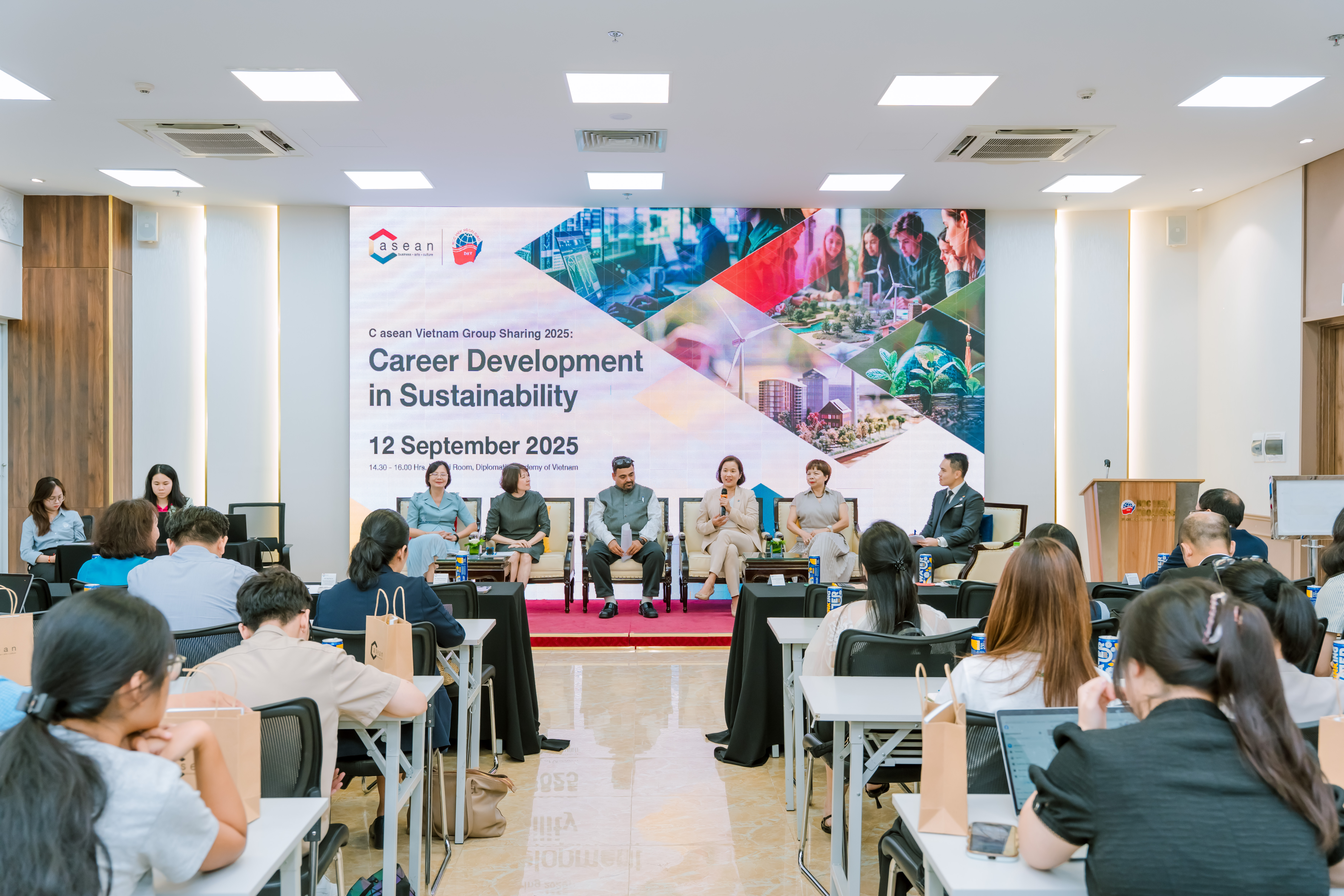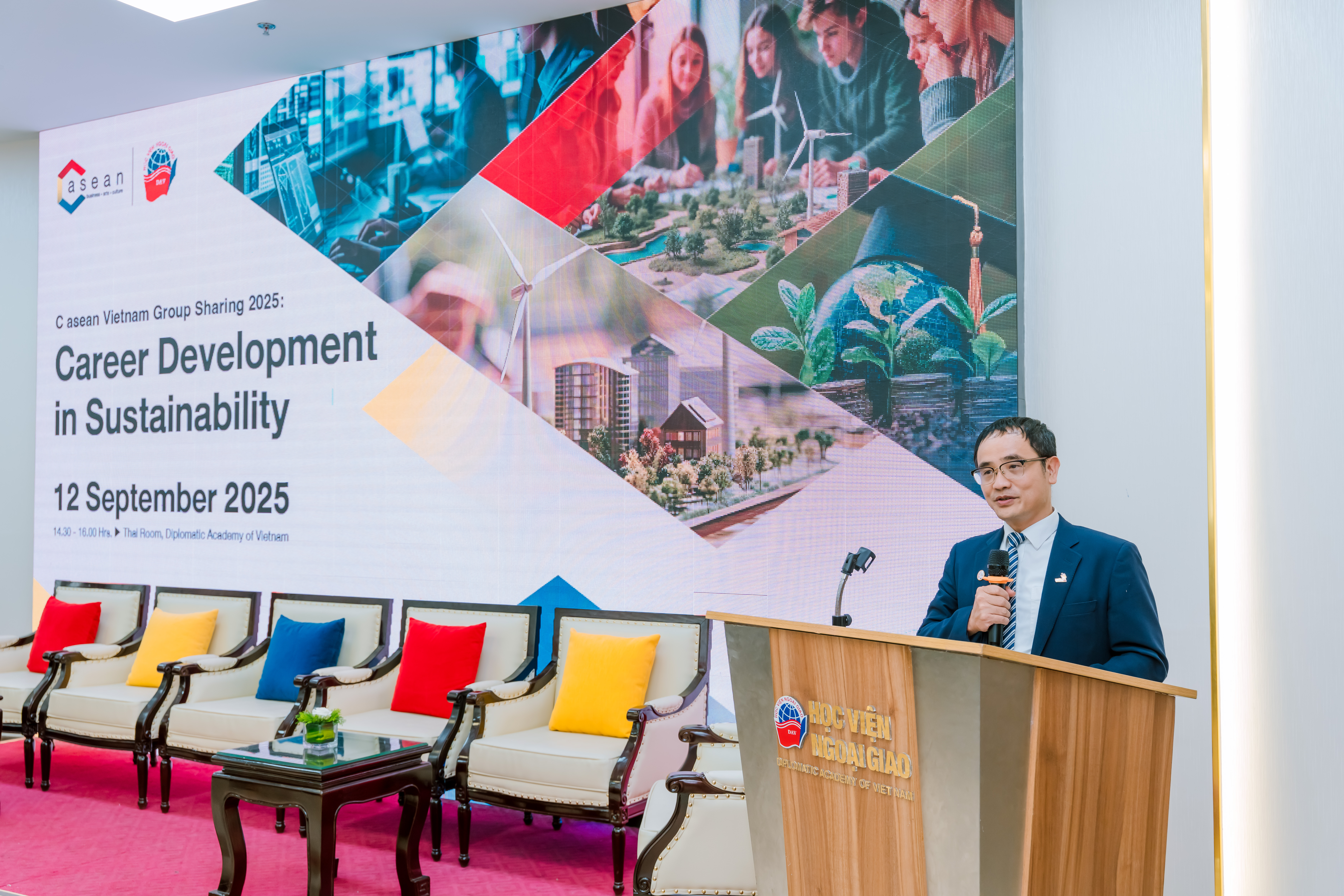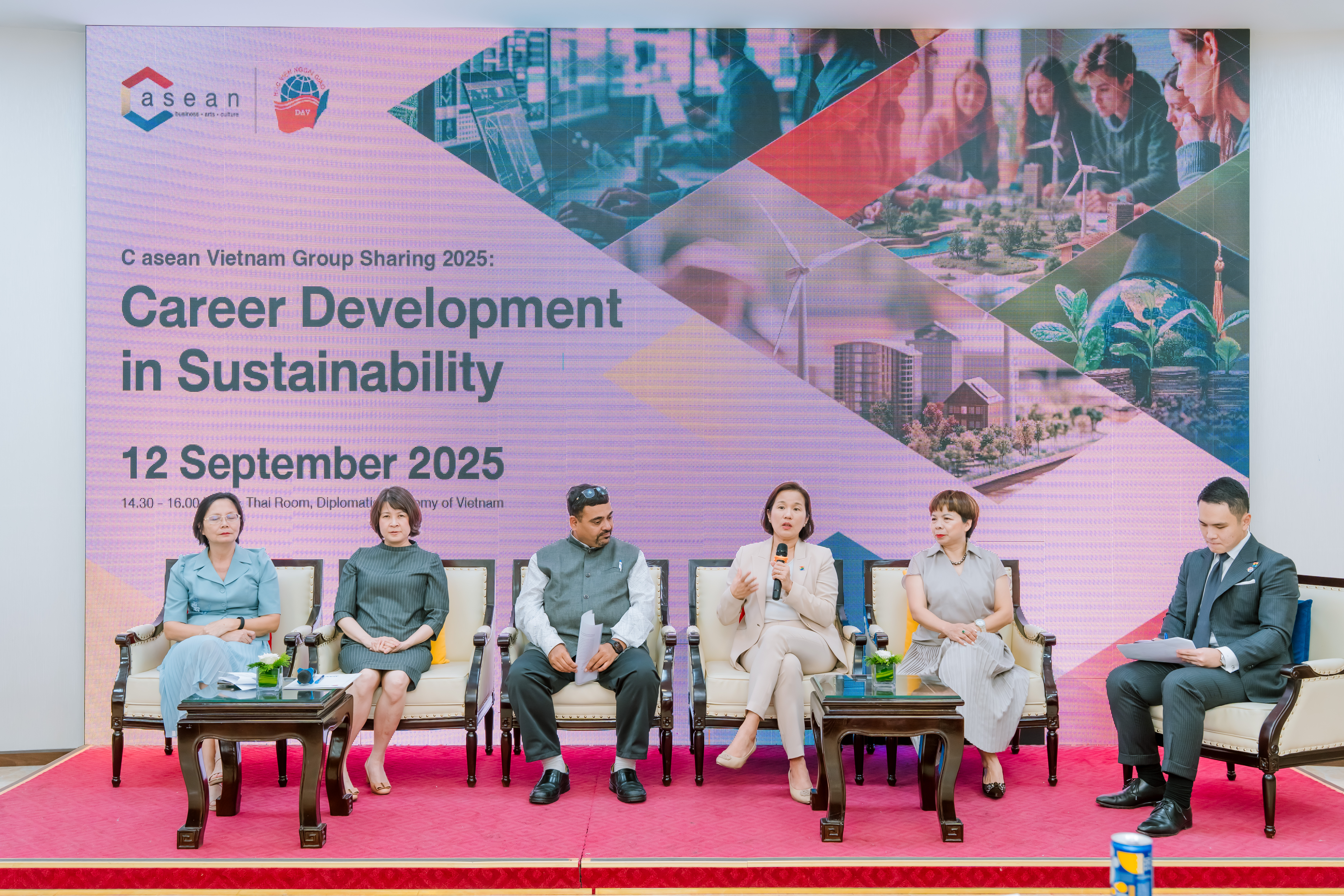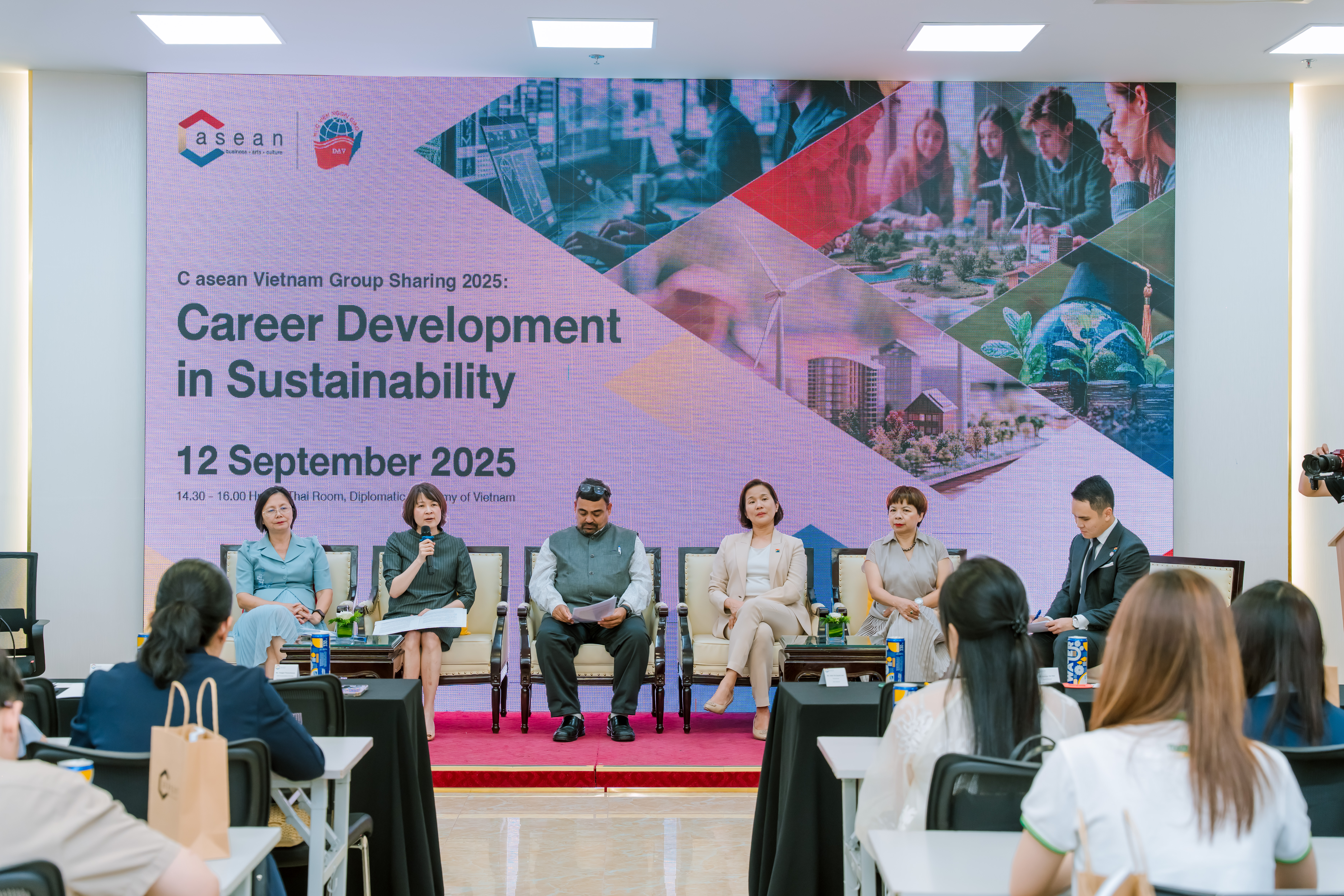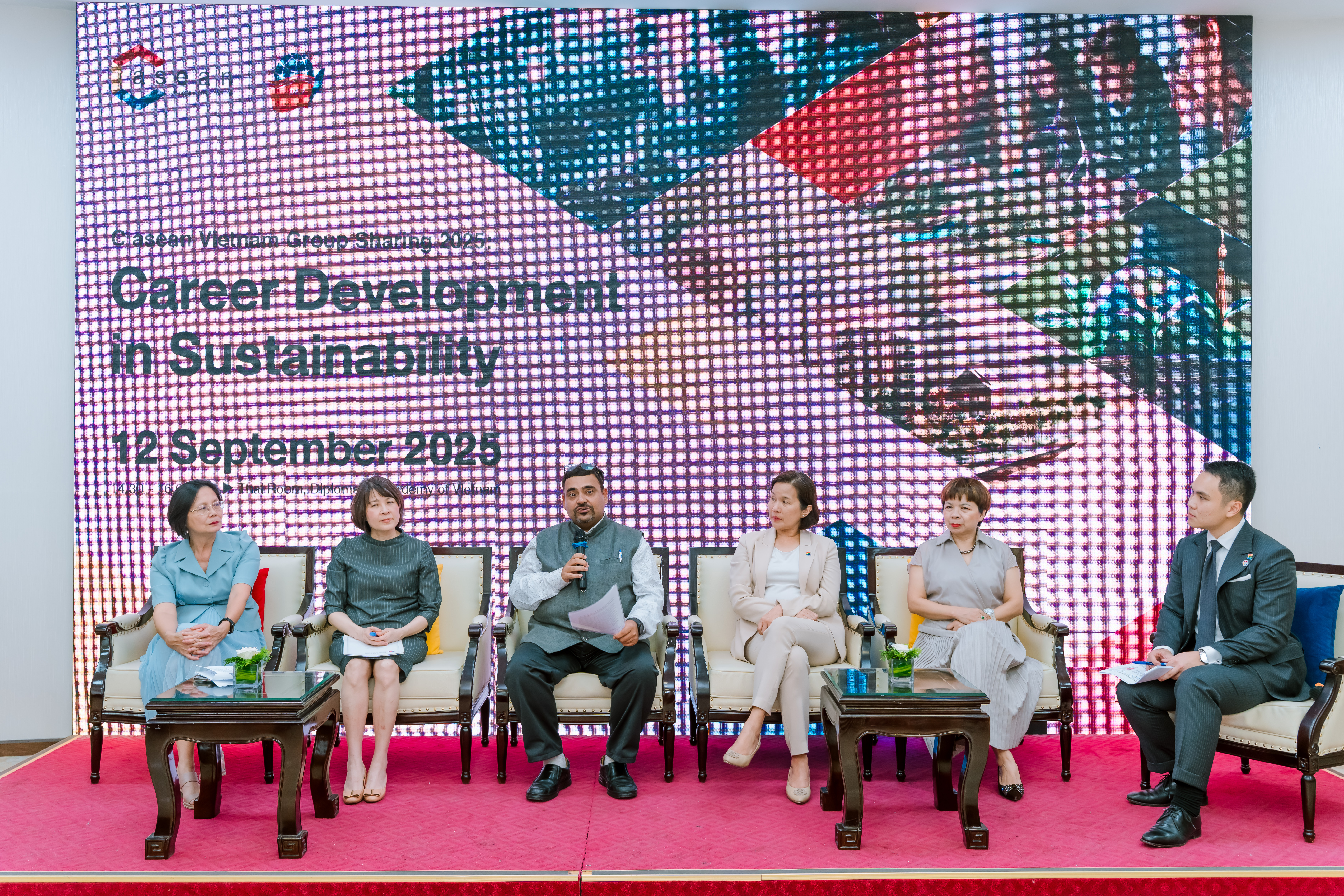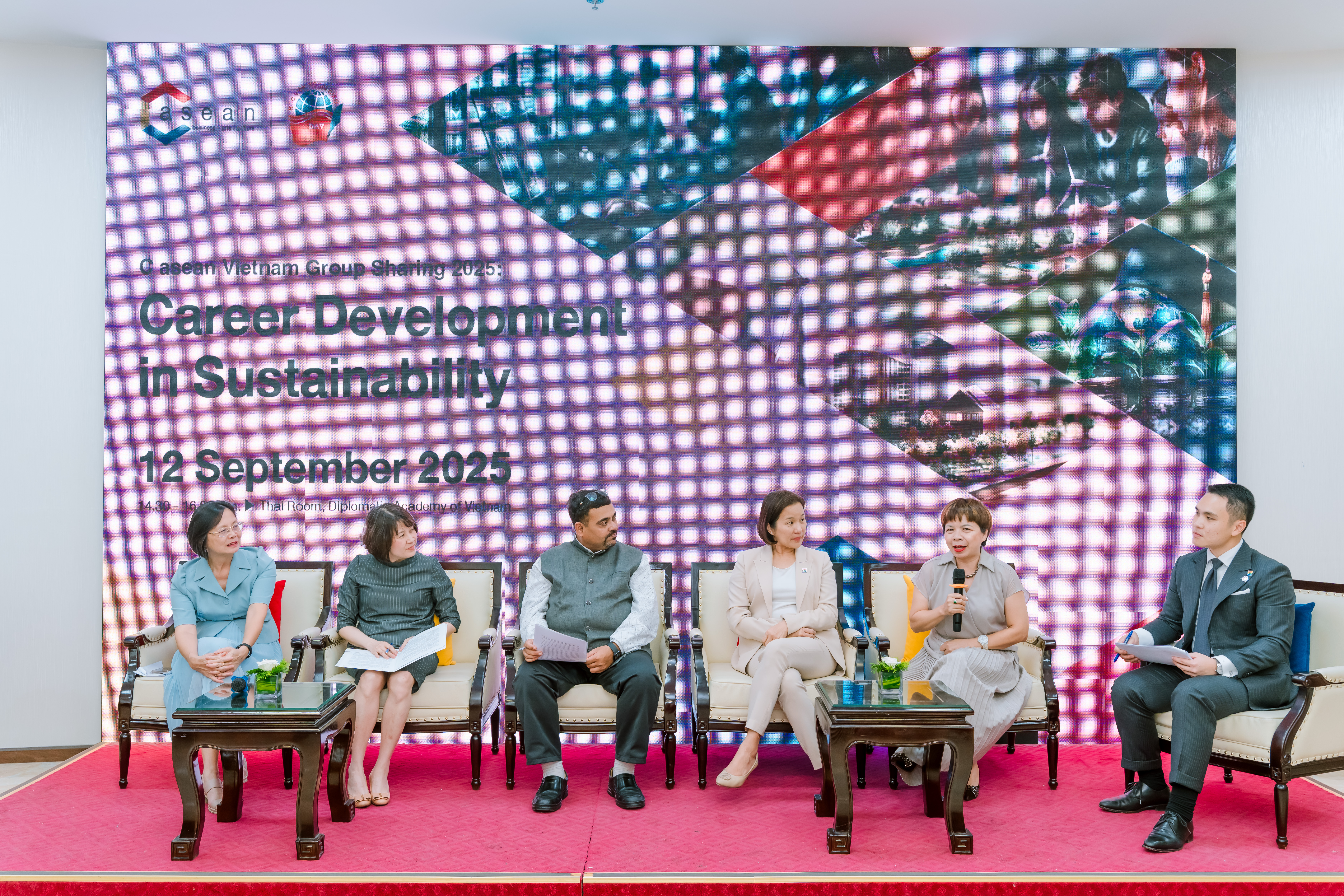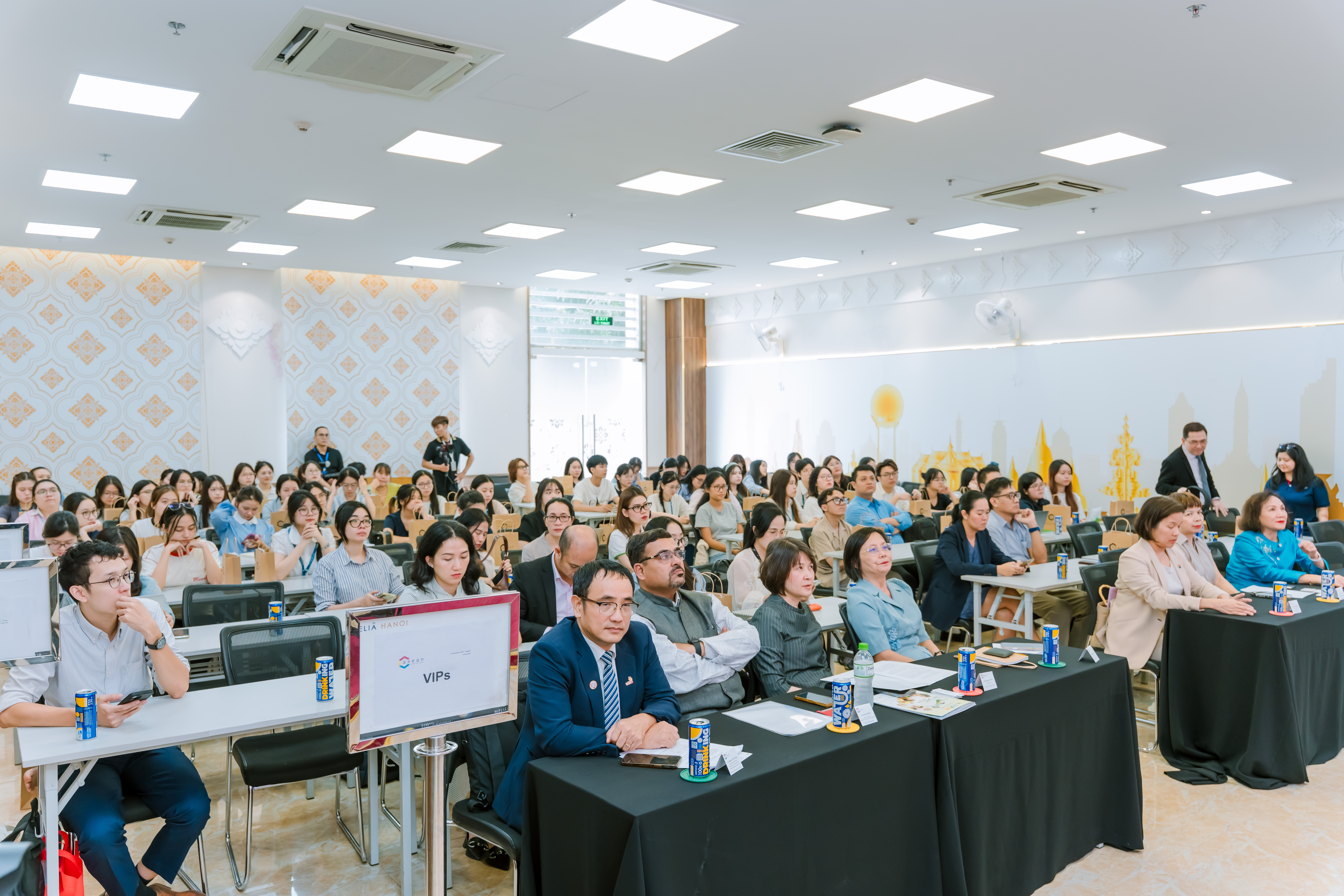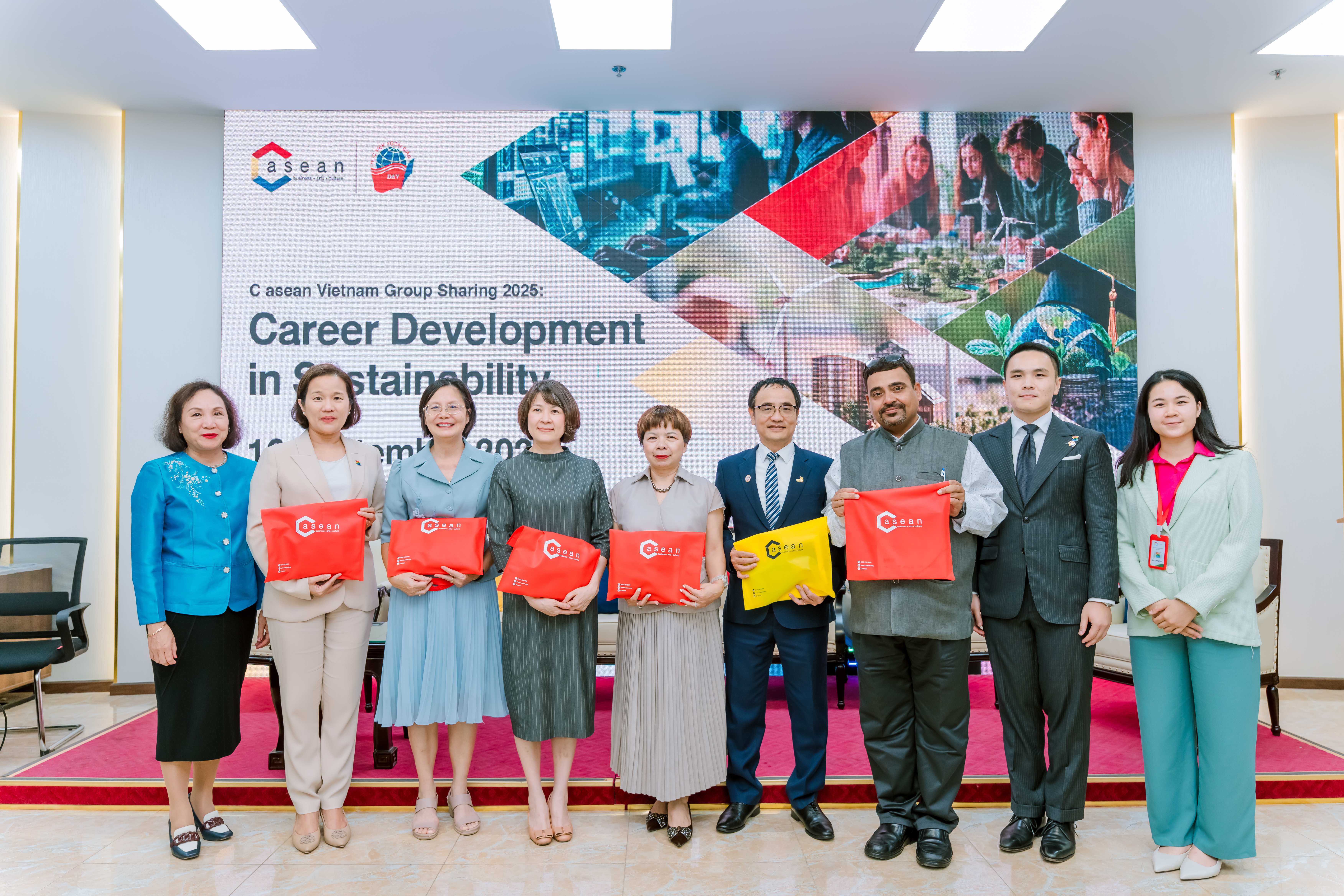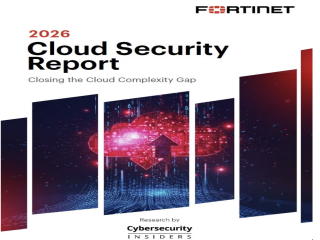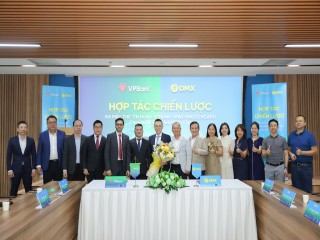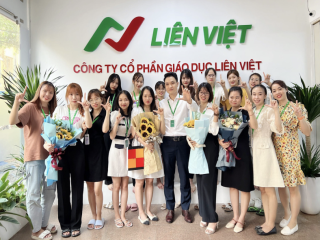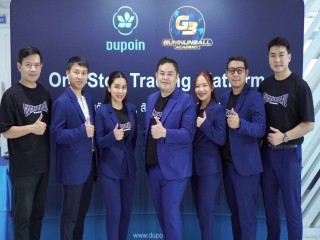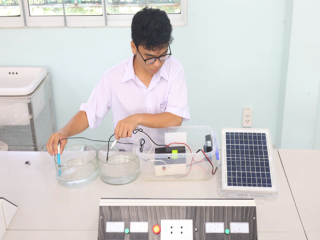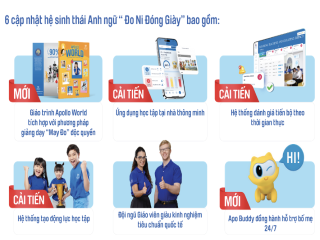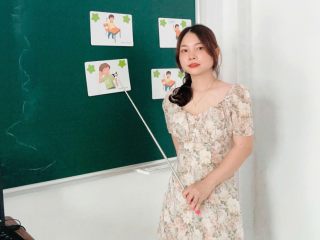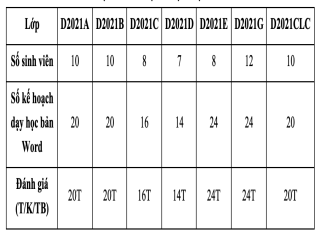HANOI, September 12, 2025 – C asean Vietnam successfully organized C asean Vietnam Group Sharing 2025: Career Development in Sustainability at the Diplomatic Academy of Vietnam in Hanoi. The event attracted participation from representatives of enterprises, government agencies, multinational corporations, leading universities, and recruitment and consulting organizations in the region. Speakers shared the latest trends and practical solutions to promote sustainable human resource development.
As the world witnesses a powerful shift toward a sustainable economy, the panel discussion highlighted the urgent need for developing skilled human resources in ESG, renewable energy, and circular economy sectors. In Vietnam, this trend presents unique opportunities to attract talent through advantages such as political stability, competitive labor costs, and supportive green investment policies. However, to fulfill sustainable development commitments, Vietnam faces the challenge of developing new workforce capabilities in sustainability-related fields while also retraining existing workers to adapt to the structural transformation of the labor market.
Government Commitment to Sustainable Workforce Development
Opening the session, Dr. Nguyen Chi Truong, Head of Skills Development, Department of Vocational and Continuing Education & Training, Ministry of Education and Training, shared that state management agencies have been researching various educational policies to encourage green human resource development in Vietnam.
Building vocational training and continuing education programs that integrate sustainable development principles is a crucial first step in guiding educational organizations to enhance training quality for students and workers in environmentally friendly fields. He emphasized the importance of educational cooperation and talent development to improve training quality and ensure Vietnamese people can compete in the regional sustainable job market.
Dr. Nguyen Chi Truong acknowledged the unprecedented pace of change in the world of work, driven by the Fourth Industrial Revolution, artificial intelligence, and global uncertainties, which are reshaping jobs, skills needs, and the very definition of a career. He highlighted that while the green transition creates new opportunities in areas like renewable energy, ESG, the circular economy, and green diplomacy, these changes also present significant challenges for students, the labor force, and the nation.
He detailed Vietnam's strong steps forward in response to these changes, including the Employment Law 2025, which has established for the first time a legal foundation for sustainable skills development, and the National Skills Testing and Certification System in place since 2013. The Politburo's Resolution 71 NQ/TW has initiated breakthrough reforms in education and training, alongside other key resolutions to promote high-quality human resource development. He emphasized that these policies collectively affirm a clear message: skills development, education, and training are central to Vietnam's aspiration to rise with confidence, dignity, and strength in the new era.
He defined a sustainable career as being built not just on knowledge, but on several core elements: basic competencies including career adaptability, professional conduct, the application of digital and green skills, occupational safety, health and well-being, and professional ethics; decent work entailing fair income, social protection, safe working conditions, opportunities for growth, and happiness at work; opportunities extending beyond finding employment to creating and sustaining jobs, innovating, and contributing to national development; and recognition of skills through the National Qualifications Framework, the National Skills Testing and Certification System, and international certifications.
To realize this vision, he stressed the necessity of participation from all stakeholders: students and young people must be proactive in learning, constantly improving their skills, and upholding professional ethics; employers are responsible for ensuring sustainable employment, investing in training, building safe and innovative workplaces, providing skills standards, and engaging with educational institutions; educational institutions must link theory with practice, design curricula aligned with standardized labor market requirements, and equip learners with knowledge, skills, and real-world experiences; and the State is tasked with establishing legal frameworks and policies, creating enabling conditions, ensuring fairness, and operating the national skills testing and certification system.
Addressing the students of the Diplomatic Academy directly, Dr. Trường stated that they are not merely learners but future diplomats, negotiators, and outstanding leaders in international law, preparing for missions rather than just jobs. He defined modern diplomacy as encompassing digital diplomacy in the AI era, climate diplomacy to address global change, economic diplomacy to promote green and fair trade, and multilateral diplomacy to strengthen cooperation across ASEAN and the world. Dr. Trường concluded by stating that a sustainable career is about building a meaningful life, contributing to the community, and sharing responsibility for the future of Vietnam and the planet.
Global Trends and Regional Skills Gap
Ms. Dinh Thi Quynh Van, Chairwoman of PwC Vietnam, shared that global sustainable career trends are developing strongly, though the skills gap in Southeast Asia remains a major challenge. She pointed out that by 2030, the sustainable career landscape will undergo fundamental changes, requiring organizations and individuals to implement changes starting now. She emphasized the necessity of developing critical environmental thinking skills, sustainable impact analysis capabilities, and deep understanding of international ESG standards to meet recruitment demands of multinational corporations.
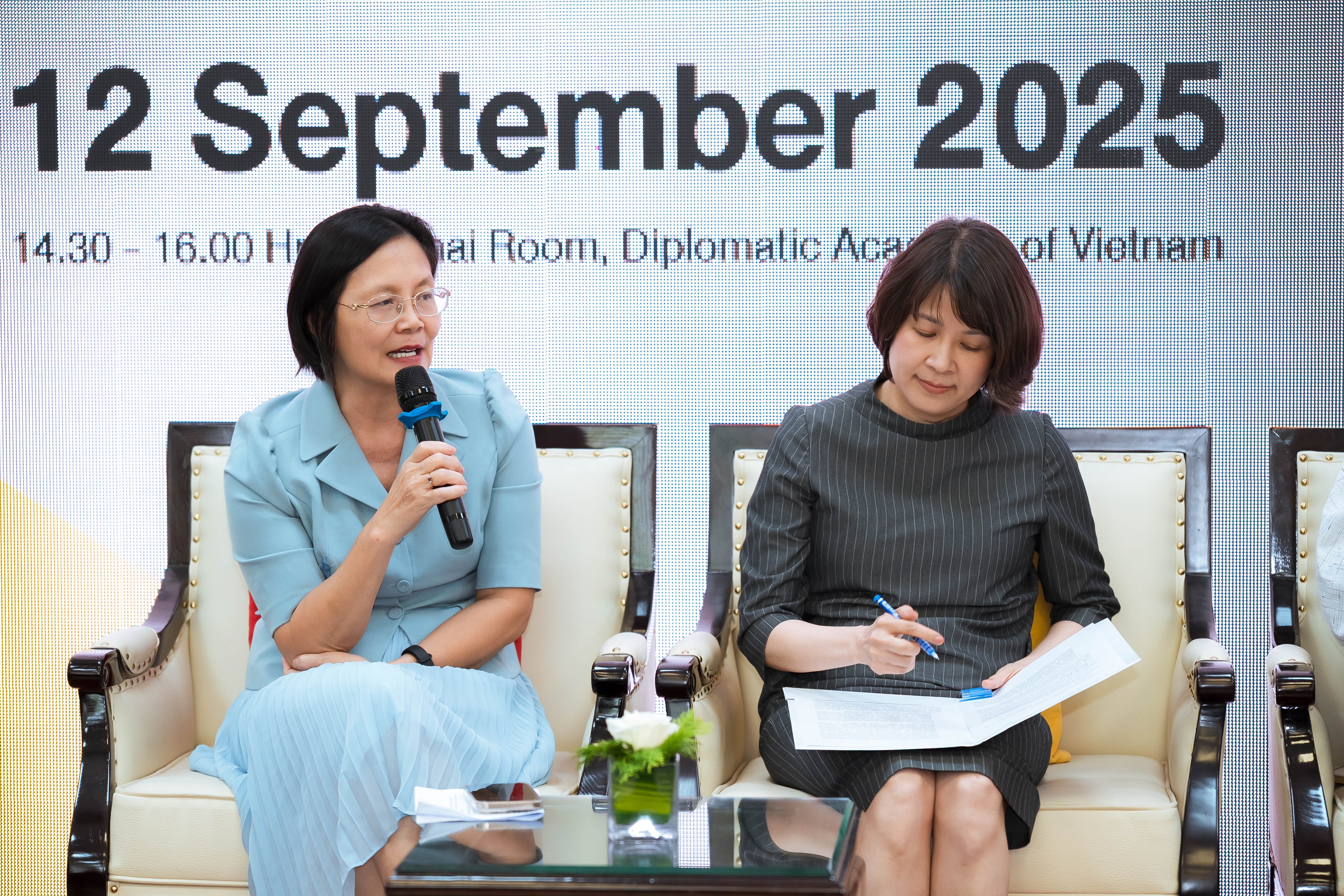
She provided an extensive overview of global trends in sustainability careers and a comparison of Vietnam's workforce skills and readiness with ASEAN. She highlighted that global trends for 2024 2025 indicate massive job creation, with the World Economic Forum projecting 170 million new jobs globally by 2030, 35 million of which are directly linked to the green transition. Climate-change mitigation is identified as the third-most transformative trend for the global labor market and the top green trend, with nearly half of surveyed employers anticipating increased investments in reducing carbon emissions and adapting to climate change.
She detailed the enablers boosting demand for sustainability jobs in Vietnam, particularly influenced by Circular 10/2023/TT BKHDT, which operationalizes Vietnam's National Green Growth Strategy and defines four strategic goals that act as job creation engines. Goal 1 on Greenhouse Gas Emissions Reduction drives demand for roles such as renewable energy engineers, carbon accountants, climate policy analysts, and emissions monitoring specialists. Goal 2 on Green Economic Reforms by Sector fosters roles like ESG compliance officers, sustainable supply chain managers, green finance specialists, and circular economy strategists. Goal 3 on Urban Development and Sustainable Consumption leads to demand for urban sustainability planners, EV infrastructure technicians, sustainable product designers, and waste management engineers. Goal 4 on Equality, Inclusion, and Resilience creates roles such as climate resilience consultants, community sustainability educators, and gender and inclusion specialists in green sectors.
Regarding Vietnam's workforce skills and sustainability career readiness, she outlined that green jobs currently constitute 3.6% of employment (1.7 million jobs), concentrated in electricity, gas, and water supply, with potential green jobs reaching 41.2% of employment, mostly in agriculture. She noted that Vietnam's green jobs require higher skill levels, especially in digital literacy, environmental knowledge, and technical expertise, but significant skill gaps exist in renewable energy, automation/Industry 4.0, soft skills, green construction/planning, and sustainable agriculture.
In comparing with the ASEAN region, she noted that while Vietnam's green jobs account for 3.6% of total employment with potential to reach 40% by 2040, the ASEAN region could generate 30 million green jobs by 2030. Looking ahead to 2030, she projected a landscape of massive job creation in green sectors, with Vietnam potentially generating up to 500,000 new green jobs, particularly in solar energy, energy efficiency, and clean transport. To prepare for this future, she recommended implementing several changes now: revamping education and training systems to embed green career pathways from secondary school, strengthening career guidance and labor market information, promoting inclusive green transitions, and mobilizing public-private partnerships.
Corporate Leadership in Sustainable Talent Strategy
Ms. Tongjai Thanachanan – Chief Sustainability & Strategy, Thai Beverage Public Company Limited (ThaiBev) shared on ThaiBev's comprehensive sustainability strategy and talent attraction approach across the ASEAN region, providing specific examples of how multinational corporations are adjusting human resource practices to support sustainability goals. She emphasized how the company translates high-level commitments into practical talent development and career creation for sustainability-minded professionals. She shared that ThaiBev’s vision is to be the Stable and Sustainable ASEAN leader. Ms. Tongjai structured the company’s sustainability execution around three concentric circles. The innermost circle focuses on evolving the company’s operation, including its production facilities, packaging, and so on. The second circle involves close partnership with the broader supply chain, including suppliers, customers, and other business partners, to collectively advance sustainable practice throughout every link—highlighting areas such as responsible sourcing, sustainable agriculture, and joint innovation projects that measurably reduce environmental footprints across ASEAN. The outermost circle—engagement with the public— reflects ThaiBev’s belief that long-term sustainability success can only be achieved through transparent public dialogue, inclusive community participation, and active contributions to social wellbeing.
Ms.Tongjai underscored that talent acquisition in sustainability today spans far more than environmental protection alone. She emphasized three pillars—Environment, Social, and Governance (ESG)—all of which demand skilled professionals. On the environmental side, ThaiBev recruits clean engineers to drive green production processes, specialists for water replenishment projects, and experts to expand forest restoration efforts throughout the region. Social sustainability spans roles dedicated to consumer health, employee wellbeing, equality, education, and support for sports and youth development. On governance, ThaiBev prioritizes hiring professionals who excel in compliance, stakeholder engagement, and policy alignment with international sustainability standards, recognizing the complex regulatory environment of ASEAN. The company places high value on candidates knowledgeable about the growing landscape of acronyms and standards; from ISO certifications, Global Reporting Initiative (GRI), and ASEAN-specific green frameworks to innovative areas like digital sustainability solutions and ethical supply chain management.
When discussing career development for students and young professionals, especially in Vietnam, Ms. Tongjai highlighted that Vietnam is a key growth market for ThaiBev —both commercially and for advancing sustainability projects. The company is committed to building robust development pathways for Vietnamese talent, actively recruiting local interns, graduates, and young professionals into sustainability-related fields, and supporting knowledge transfer programs between ThaiBev teams in Thailand and Vietnam. She described bespoke training opportunities and international exposure initiatives that help Vietnamese employees expand their skills in sustainability—from operational roles in eco-friendly production and responsible sourcing to leadership tracks in social innovation and compliance.
Ms. Tongjai urged students to recognize that sustainability spans many disciplines and presents a wealth of opportunities. Engineers in Vietnam can pioneer green manufacturing; community development specialists can engage in reforestation and water management projects; and innovation professionals can shape new products and CSR programs that enhance both ThaiBev’s business and the communities the company serves. She stressed that successful candidates for sustainability roles are not only skilled in technical domains but also exhibit curiosity, ethical integrity, cross-cultural awareness, and the agility to adapt as global standards evolve. She also mentioned that ThaiBev always ensure the mobility for employees, offering opportunities for relocation within the Group’s markets.
Diplomatic Training for Regional Sustainability Cooperation
Ms. Nguyen Thi Thin, Deputy Director of the Diplomatic Academy of Vietnam, presented the increasingly important role of diplomatic training in promoting regional cooperation on sustainable development initiatives, particularly within the ASEAN community. She shared specific programs that the Diplomatic Academy of Vietnam has developed to prepare future diplomats for active participation in sustainable development policy negotiations. She emphasized that diplomatic expertise is essential for advancing Vietnam's sustainability agenda internationally and regionally.
Ms. Thin spoke extensively about the pivotal role of diplomatic training in advancing regional cooperation for sustainable development, emphasizing that sustainable development is a global necessity tied to the survival and future of every nation and the planet. She stated that ASEAN, with its nearly 700 million people, dynamic economies, and rich cultural diversity, has both the responsibility and opportunity to become a model of linking growth with sustainability. In this context, diplomacy plays a critical role by providing a channel for countries to address transboundary challenges such as climate change, environmental degradation, food security, water security and energy transition.
She underscored that diplomatic training is indispensable because strong diplomacy relies on well-prepared human resources: diplomats with vision, expertise, adaptability, and the capacity to engage constructively in multilateral cooperation. Training is not only about providing knowledge and skills but also cultivating strategic thinking, fostering a cooperative spirit, and equipping students with capacities to work across diverse disciplines, from politics, economics, environment, and technology to culture and social development. She stressed that ASEAN's collective efforts for sustainable development require a generation of young diplomats who can operate in cross-sectoral settings and understand the nexus between foreign policy and sustainability.
She elaborated on the Diplomatic Academy of Vietnam and its programs for future diplomats. Established in 1959, DAV is a leading institution in Vietnam for international relations and foreign affairs, having trained generations of Vietnamese high-ranking politicians and diplomats, and serving as a hub for international academic and professional cooperation. DAV's key strategies include integrating components of sustainability development into its curricula or introducing a separate course on global governance, etc.
The Academy strengthens negotiation skills through regular participation in international simulations like Model UN or ASEAN+ forums, where sustainable development and climate change issues are discussed. The Academy nurtures innovation and policy- oriented thinking through student programs like the D.I.P Game, research projects or extracurricular activities where potential diplomats propose policy ideas, some of which have been presented at regional forums. Looking ahead, DAV proposes the possibility of building a Thailand-Vietnam Youth Network for Sustainable Development so that Thailand and Vietnam can jointly design courses, exchange students and lecturers with the focus on sustainability issues.
Academic Innovation in Sustainability Education
Dr. Ananya Mehta, Senior Lecturer, School of Communication and Design, RMIT University Vietnam, presented on specific competencies that RMIT prioritizes to prepare graduates for emerging sustainability roles that industry partners are recruiting for. The mentorship and networking programs leverages RMIT's global network to help Vietnamese students connect with sustainability professionals and career opportunities worldwide. He emphasized the importance of integrating sustainability thinking across all disciplines, not just environmental fields, to create a generation of professionals who can lead the green transition in every sector.
Dr. Mehta elaborated extensively on RMIT University Vietnam's comprehensive approach to preparing graduates for emerging sustainability roles and the extensive mentorship and networking opportunities it provides. He emphasized that RMIT prioritizes building a sustainability mindset and interdisciplinary problem-solving skills as core competencies that extend far beyond traditional environmental studies. The university's curriculum goes beyond theory, focusing on developing a specific set of interconnected competencies, including interdisciplinary collaboration, critical thinking, and future-focused problem-solving – skills highly sought after by industry partners for tackling complex sustainability challenges.
RMIT integrates the United Nations Sustainable Development Goals SDGs across its diverse curriculum, ensuring students understand the social impact of their work regardless of their chosen field of study. This theoretical foundation is brought to life through hands-on programs like the Sustainability Impact Challenge, where students from various disciplines collaborate on real-world projects for leading companies, addressing actual business challenges while developing practical sustainability expertise. The campus itself serves as a "living laboratory," where students apply concepts like the circular economy through practical initiatives that demonstrate sustainable practices in action.
Beyond technical expertise, RMIT actively cultivates a deep-seated sustainability mindset and a sense of ethical responsibility, empowering graduates to become proactive leaders and advocates for positive, lasting changes in their future careers. The university recognizes that sustainability challenges require professionals who can think systemically, collaborate across disciplines, and maintain long-term perspective while delivering immediate results.
Regarding mentorship and networking programs, Dr. Mehta highlighted how RMIT leverages its extensive global network to provide unparalleled opportunities for Vietnamese students in the sustainability sector. A key component is the robust RMIT Alumni Network, comprising approximately 20,000 members in Vietnam alone, many of whom are leading professionals in various sustainability-related fields. This powerful community acts as a vital resource, connecting students with established sustainability professionals through various events and campaigns that raise awareness about eco-friendly living and business practices.
Furthermore, structured approaches like the annual Sustainability Impact Challenge provide a direct pipeline to the professional world. In this challenge, students not only solve real-world sustainability problems but are also directly mentored by corporate leaders and technical experts from industry partners. This project-based mentorship offers invaluable, hands-on experience and has a proven track record of creating tangible career opportunities, with many participants receiving job offers or internship opportunities directly from their project partners. By connecting students with this extensive network of alumni and corporate partners, RMIT ensures that graduates are equipped not just with a degree, but with a professional network and the practical experience necessary to launch a successful career in the green economy.
Recruitment Evolution and Leadership Development
Ms. Dang Thuy Ha, Head of Northern Region, Strategic Business and People Advisor, TalentNet Corporation, analyzed how sustainability requirements are fundamentally reshaping recruitment strategies and leadership development across industries in Vietnam. She presented innovative collaborative initiatives designed to build a high-quality sustainable talent ecosystem that can support the country's green transformation goals. Her insights revealed how traditional recruitment practices are evolving to prioritize sustainability knowledge, environmental awareness, and green innovation capabilities in candidates across all fields.
She provided an extensive analysis of how sustainability requirements are fundamentally reshaping recruitment strategies and leadership development, necessitating a strategic alignment between HR functions and an organization's long-term business objectives. She emphasized that HR must transform from a transactional function into a strategic partner to support sustainable growth, as traditional short-term financial priorities often lead to talent shortages and weak leadership pipelines that cannot support long-term sustainability goals.
In recruitment, she highlighted several significant shifts that are revolutionizing how organizations attract and select talent. The 4B HR model Buy, Build, Borrow, and BOT) is gaining prominence as a comprehensive framework for talent acquisition in the sustainability era. "Buying" talent now involves refining sourcing channels to attract individuals with purpose- driven mindsets, green skills, ethical leadership capabilities, and sustainable operations expertise. "Building" internal capabilities is crucial, encouraging companies to develop their current workforce for sustainability-related roles through comprehensive upskilling and reskilling programs. "Borrowing" talent through consultants or freelancers provides access to specialized knowledge when supply is limited, particularly for emerging green technologies and regulatory compliance. Finally, "BOT" signifies the integration of artificial intelligence and digital recruitment infrastructure for automated screening, AI-driven tracking, predictive analytics, and chatbots, helping identify candidates aligned with an organization's culture and sustainability values.
A growing skills-first approach prioritizes practical competencies, problem-solving abilities, and adaptability over academic qualifications. Leading corporations like IBM, Google, and VinGroup have adopted this approach, focusing on sustainability expertise, digital literacy, and ESG knowledge. Vietnam's mature workforce makes this model particularly effective, as many experienced professionals can be reskilled for green roles more efficiently than training new graduates from scratch.
The ideal talent profile is being redefined, valuing resilience, collaboration, integrity, and long- term thinking over traditional performance metrics. Traditional CVs are insufficient for evaluating potential contributions to sustainability, leading organizations to incorporate behavioral assessments, cultural adaptability evaluations, and value alignment interviews. This ensures new hires not only possess technical skills but can also thrive in sustainability-oriented cultures and contribute to long-term organizational goals.
She also detailed the profound influence of sustainability on leadership development, noting that leaders are no longer solely expected to deliver business results but must balance performance with social responsibility and long-term value creation. The role of a leader is evolving into that of a system leader, capable of recognizing interconnected consequences across economic, social, and environmental dimensions. The rise of generative AI affects 80% of jobs, requiring leaders to guide human-AI collaboration effectively, balancing productivity with ethical considerations, inclusiveness, and job security. She concluded by highlighting Vietnam's efforts in building a high-quality sustainable talent ecosystem, which requires collective action from businesses, universities, government agencies, and professional associations.
Initiatives include national awareness campaigns on green jobs, bridging the education-industry gap through co- developed curricula and internships, and creating thriving work environments through smart city projects and startup hubs. The evolving Employee Value Proposition, guided by the 5P framework Pay, People, Purpose, Progress, Place), positions sustainability as a differentiator, with public-private partnerships enhancing Vietnam's image as a hub for sustainable careers.
Key Outcomes and Future Directions
The panel discussion provided deep insights into advancing sustainable talent development and created collaboration opportunities to promote green workforce ecosystem development in Vietnam. Delegates emphasized the importance of coordination between educational organizations, businesses, and management agencies to advance workforce preparation for the sustainable economy and enhance Vietnam's competitiveness in the regional green labor market.
|
About SX Roadshow 2025 Vietnam On the same day, C asean Vietnam organized the SX Roadshow 2025 Vietnam event, which is part of Sustainability Expo 2025 SX2025, ASEAN's largest sustainability exhibition, taking place from September 26 to October 5 at the Queen Sirikit National Convention Center in Bangkok, Thailand, under the theme "Good Balance – Better World." The event demonstrates C asean Vietnam's commitment to promoting sustainable development and regional connectivity. The success of this event reinforces C asean Vietnam's unwavering commitment to advancing sustainable talent development and strengthening Vietnam's strategic position in the regional sustainable economy. Moving forward, C asean Vietnam will continue its mission of connecting ASEAN Communities through activities related to sustainable business, arts and culture, and talent development. About C asean Vietnam C asean Vietnam is the Vietnam branch of C asean, established in June 2022 with the mission of creating a platform to connect ASEAN communities. It focuses on three key pillars: business and sustainability, leadership and talent development, and arts and culture, under the auspices of Thai Beverage Plc. (ThaiBev). Since its establishment, C asean Vietnam has collaborated with various public and private organizations to enhance regional connectivity and promote sustainable development across all sectors of the economy, from young entrepreneurs to large corporations. In addition, C asean Vietnam has nurtured future ASEAN leaders through a variety of leadership and talent development programs. C asean also organizes ASEAN art and cultural dialogues, believing that art is the universal language that creates strong connections of understanding and harmony. A highlight of these efforts is C asean Consonant, the only traditional ASEAN music ensemble featuring 10 artists from 10 countries. In Vietnam, some notable ASEAN-related activities organized by C asean Vietnam include the Sharing Session on “Vietnam in ASEAN” (2024–2025), the showcase on “Water Festivals in ASEAN” (2023), and the C asean Consonant Concert “Friendship beyond Frontier” (2023). |

